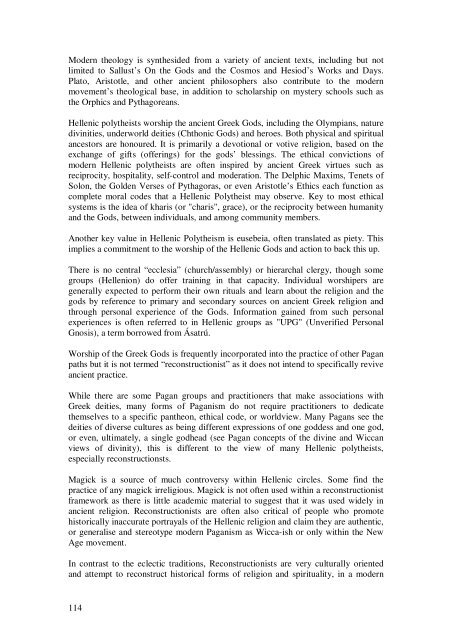Paganism an overview introduction - South African Pagan Council
Paganism an overview introduction - South African Pagan Council
Paganism an overview introduction - South African Pagan Council
Create successful ePaper yourself
Turn your PDF publications into a flip-book with our unique Google optimized e-Paper software.
Modern theology is synthesided from a variety of <strong>an</strong>cient texts, including but not<br />
limited to Sallust’s On the Gods <strong>an</strong>d the Cosmos <strong>an</strong>d Hesiod’s Works <strong>an</strong>d Days.<br />
Plato, Aristotle, <strong>an</strong>d other <strong>an</strong>cient philosophers also contribute to the modern<br />
movement’s theological base, in addition to scholarship on mystery schools such as<br />
the Orphics <strong>an</strong>d Pythagore<strong>an</strong>s.<br />
Hellenic polytheists worship the <strong>an</strong>cient Greek Gods, including the Olympi<strong>an</strong>s, nature<br />
divinities, underworld deities (Chthonic Gods) <strong>an</strong>d heroes. Both physical <strong>an</strong>d spiritual<br />
<strong>an</strong>cestors are honoured. It is primarily a devotional or votive religion, based on the<br />
exch<strong>an</strong>ge of gifts (offerings) for the gods’ blessings. The ethical convictions of<br />
modern Hellenic polytheists are often inspired by <strong>an</strong>cient Greek virtues such as<br />
reciprocity, hospitality, self-control <strong>an</strong>d moderation. The Delphic Maxims, Tenets of<br />
Solon, the Golden Verses of Pythagoras, or even Aristotle’s Ethics each function as<br />
complete moral codes that a Hellenic Polytheist may observe. Key to most ethical<br />
systems is the idea of kharis (or "charis", grace), or the reciprocity between hum<strong>an</strong>ity<br />
<strong>an</strong>d the Gods, between individuals, <strong>an</strong>d among community members.<br />
Another key value in Hellenic Polytheism is eusebeia, often tr<strong>an</strong>slated as piety. This<br />
implies a commitment to the worship of the Hellenic Gods <strong>an</strong>d action to back this up.<br />
There is no central “ecclesia” (church/assembly) or hierarchal clergy, though some<br />
groups (Hellenion) do offer training in that capacity. Individual worshipers are<br />
generally expected to perform their own rituals <strong>an</strong>d learn about the religion <strong>an</strong>d the<br />
gods by reference to primary <strong>an</strong>d secondary sources on <strong>an</strong>cient Greek religion <strong>an</strong>d<br />
through personal experience of the Gods. Information gained from such personal<br />
experiences is often referred to in Hellenic groups as "UPG" (Unverified Personal<br />
Gnosis), a term borrowed from Ásatrú.<br />
Worship of the Greek Gods is frequently incorporated into the practice of other Pag<strong>an</strong><br />
paths but it is not termed “reconstructionist” as it does not intend to specifically revive<br />
<strong>an</strong>cient practice.<br />
While there are some Pag<strong>an</strong> groups <strong>an</strong>d practitioners that make associations with<br />
Greek deities, m<strong>an</strong>y forms of <strong>Pag<strong>an</strong>ism</strong> do not require practitioners to dedicate<br />
themselves to a specific p<strong>an</strong>theon, ethical code, or worldview. M<strong>an</strong>y Pag<strong>an</strong>s see the<br />
deities of diverse cultures as being different expressions of one goddess <strong>an</strong>d one god,<br />
or even, ultimately, a single godhead (see Pag<strong>an</strong> concepts of the divine <strong>an</strong>d Wicc<strong>an</strong><br />
views of divinity), this is different to the view of m<strong>an</strong>y Hellenic polytheists,<br />
especially reconstructionsts.<br />
Magick is a source of much controversy within Hellenic circles. Some find the<br />
practice of <strong>an</strong>y magick irreligious. Magick is not often used within a reconstructionist<br />
framework as there is little academic material to suggest that it was used widely in<br />
<strong>an</strong>cient religion. Reconstructionists are often also critical of people who promote<br />
historically inaccurate portrayals of the Hellenic religion <strong>an</strong>d claim they are authentic,<br />
or generalise <strong>an</strong>d stereotype modern <strong>Pag<strong>an</strong>ism</strong> as Wicca-ish or only within the New<br />
Age movement.<br />
In contrast to the eclectic traditions, Reconstructionists are very culturally oriented<br />
<strong>an</strong>d attempt to reconstruct historical forms of religion <strong>an</strong>d spirituality, in a modern<br />
114


